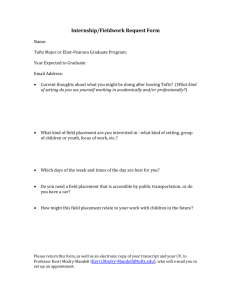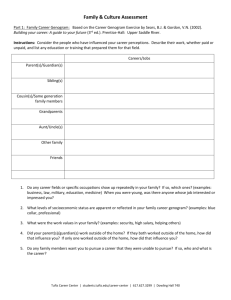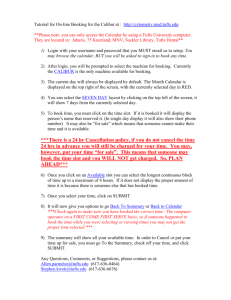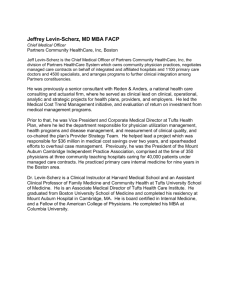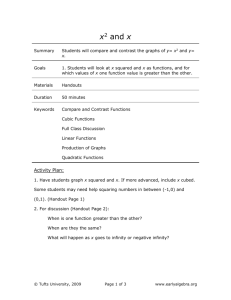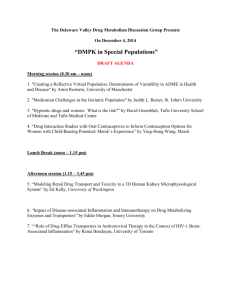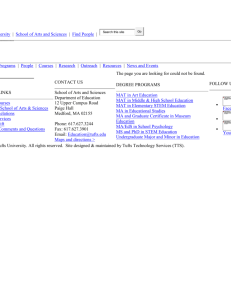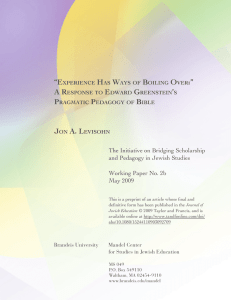Syllabus
advertisement
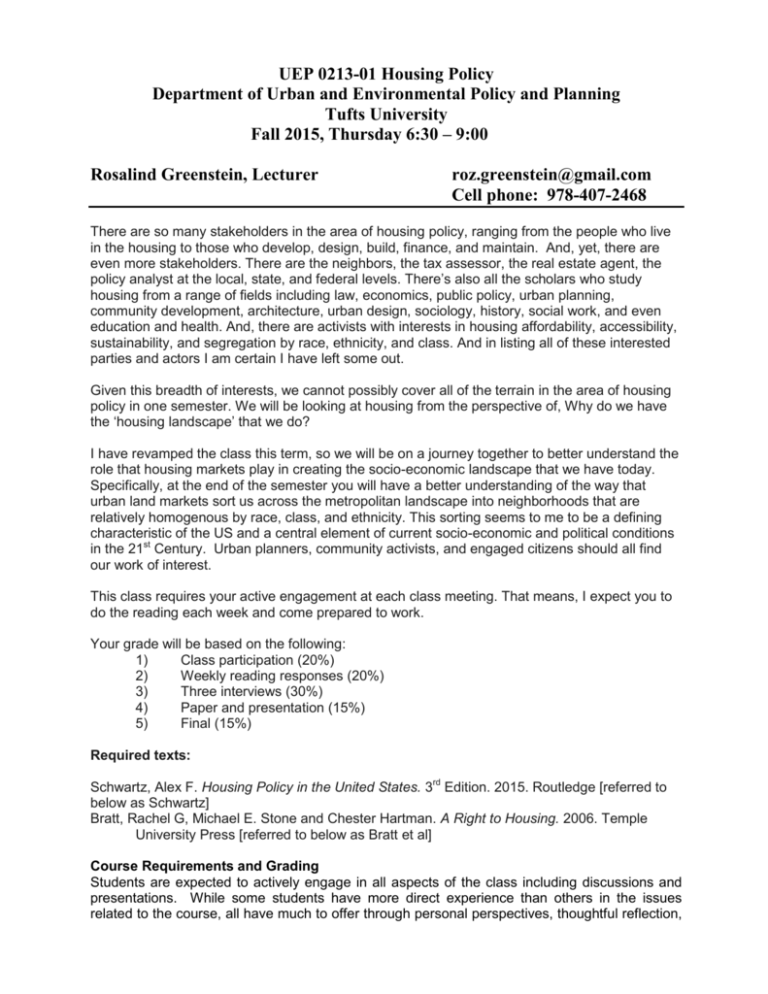
UEP 0213-01 Housing Policy Department of Urban and Environmental Policy and Planning Tufts University Fall 2015, Thursday 6:30 – 9:00 Rosalind Greenstein, Lecturer roz.greenstein@gmail.com Cell phone: 978-407-2468 There are so many stakeholders in the area of housing policy, ranging from the people who live in the housing to those who develop, design, build, finance, and maintain. And, yet, there are even more stakeholders. There are the neighbors, the tax assessor, the real estate agent, the policy analyst at the local, state, and federal levels. There’s also all the scholars who study housing from a range of fields including law, economics, public policy, urban planning, community development, architecture, urban design, sociology, history, social work, and even education and health. And, there are activists with interests in housing affordability, accessibility, sustainability, and segregation by race, ethnicity, and class. And in listing all of these interested parties and actors I am certain I have left some out. Given this breadth of interests, we cannot possibly cover all of the terrain in the area of housing policy in one semester. We will be looking at housing from the perspective of, Why do we have the ‘housing landscape’ that we do? I have revamped the class this term, so we will be on a journey together to better understand the role that housing markets play in creating the socio-economic landscape that we have today. Specifically, at the end of the semester you will have a better understanding of the way that urban land markets sort us across the metropolitan landscape into neighborhoods that are relatively homogenous by race, class, and ethnicity. This sorting seems to me to be a defining characteristic of the US and a central element of current socio-economic and political conditions in the 21st Century. Urban planners, community activists, and engaged citizens should all find our work of interest. This class requires your active engagement at each class meeting. That means, I expect you to do the reading each week and come prepared to work. Your grade will be based on the following: 1) Class participation (20%) 2) Weekly reading responses (20%) 3) Three interviews (30%) 4) Paper and presentation (15%) 5) Final (15%) Required texts: Schwartz, Alex F. Housing Policy in the United States. 3rd Edition. 2015. Routledge [referred to below as Schwartz] Bratt, Rachel G, Michael E. Stone and Chester Hartman. A Right to Housing. 2006. Temple University Press [referred to below as Bratt et al] Course Requirements and Grading Students are expected to actively engage in all aspects of the class including discussions and presentations. While some students have more direct experience than others in the issues related to the course, all have much to offer through personal perspectives, thoughtful reflection, Tufts University R. Greenstein UEP-0213 Fall 2015 P age |2 and the curiosity and passion each brings to the material. Our experience as a class, and each student’s individual experience in this class, will be considerably richer if everyone participates. Reading response and class participation Come to class prepared to fully participate. That means, having read the material and written a response to the readings. Use the reading response to tell me if you agree or disagree with the author (sometimes your (dis)agreement will be qualified. And, tell me how the reading relates to your world or other reading in this class or your reading in other classes or at other times. Then, engage in some critical thinking. For example, has this reading caused you to change your thinking or does it lead you to want to revisit prior information or a conversation or argument you had with someone? This reading response is where you challenge yourself and demonstrate that to me. And, it is where you prepare for active engagement n the class. Three interviews There are three assignments due throughout the course of the semester. These assignments involve both group and individual work. As a class we will generate a list of housing organizations and agencies. In groups of about 3 you will identify people to interview and generate an interview schedule (i.e., a list of questions.) Individually you will then conduct interviews and write these up. Throughout the course of the semester you will interview a housing advocate, a policy maker, and someone involved in housing from the private sector. Paper and presentation This is a 10-12 page paper that addresses a housing policy topic of your choice, as long as you phrase the title in the form of a question. Presentations will be during the final two classes. Each presentation will be 15 minutes long. You can use this paper to either dig deeper on a topic that we do cover, or you can explore a housing topic that we do not explicitly cover. You will need to submit a topic and a research question by September 24th. Please take this deadline seriously; I will. Final exam There will be a take-home final exam for this class. Logistics for turning in the exam will follow. Expectations I expect professional standards. First, I expect you to know the University’s standards of academic integrity. There is no room for plagiarism or other forms of dishonesty in this class. Let me repeat, there is no room for plagiarism or other forms of dishonesty in this class. You are 100% responsible for your conduct in this regard. Be sure that you understand Tufts code of conduct in this regard. (See: http://uss.tufts.edu/studentAffairs/documents/TuftsStudentHandbook.pdf) Second, all work is to represent your best effort; it is to look good, and it is to be on time. If work is late, I will reduce your grade for every calendar day it is late. I will accept late work, without penalty, only if you have a sudden personal emergency. Please check the calendar and let me know by our second meeting if you have any conflicts due to religious observance. Please let me know by our second meeting if you foresee any complications in completing the work of this class due to disabilities. Page 2 of 6 Tufts University R. Greenstein UEP-0213 Fall 2015 P age |3 Disclaimers This schedule, assigned readings, and other components of the syllabus may change. Competencies and Knowledge Areas History of U.S. housing policies and programs How housing is connected to larger political and economic forces/policies Ways in which racial issues have permeated housing programs and how government has sought to address this area of concern; fair housing laws Cultural roots of housing tenure preferences (e.g., homeownership vs. rental) Roles of federal, state, and local governments in addressing housing problems Role of the private for-profit sector in the development of housing policies The banking industry and federal supports for housing The subprime crisis and the roles of key public and private actors and institutions Roles of residents in federal, local initiatives; organizing, lobbying, community development approaches to gaining political power in housing controversies Range of nonprofits involved with housing development and management Mechanisms for subsidizing housing programs and relative advantages/disadvantages; beneficiaries of federal housing subsidies; program implementation New models for addressing housing issues Class 1 (Sept 10) Class 2 (Sept 17) Introduction Housing as a right. Readings Chester Hartman. “The Case for a Right to Housing” in Bratt et al Kennedy, Edward M. “Fair Housing—The Battle Goes on.” Cityscape: A Journal of Policy Development and Research. Volume 4, Number 3. 1999 Feagin, Joe R. “Excluding Blacks and Others from Housing: the foundation of white racism.” Cityscape: A Journal of Policy Development and Research. Volume 4, Number 3. 1999 Audio This American Life Podcast for program 562: The problem we all live with- Part one Aired July 31, 2015. http://www.thisamericanlife.org/radioarchives/episode/562/the-problem-we-all-live-with Page 3 of 6 Tufts University R. Greenstein Class 3 (Sept 24) UEP-0213 Fall 2015 P age |4 Capabilities. Readings Research topic and research question due Class 4 (Oct 1) First interview due Sen, Amartya. 2005. “Human Rights and Capabilities.” Journal of Human Development Vol. 6, No. 2, July 2005. Nussbaum, Martha. “Capabilities as Fundamental Entitlements: Sen and Social Justice.” Feminist Economics 9(2–3), 2003, 33–59 Shlay, Anne B. 1995. “Housing in the Broader Context in the United States.” Housing Policy Debate • Volume 6, Issue 3 Audio This American Life Podcast for program 563: The problem we all live with Part two. Aired Aug 7, 2015 http://www.thisamericanlife.org/radioarchives/episode/563/the-problem-we-all-live-withpart-two Public Housing. Schwartz. Chapter 6. Bauman, John F. 1994. “Public Housing: the dreadful saga of a durable policy. Journal of Planning Literature. Vol. 8, No. 4. May. von Hoffman, Alexander. 1996. “High Ambitions: The Past and Future of American Low-Income Housing Policy” Housing Policy Debate Volume 7, Issue 3 In class movie (The Myth of Pruitt-Igoe) Class 5 (Oct 8) Subsidized Housing. Schwartz Chapters 5 & 7 Bratt et al Chapters 5 & 7 Class 6 (Oct 15) Homeownership. Schwartz Chapters 3 & 4 Lawton, Julie D. Limited Equity Cooperatives: The NonEconomic Value of Homeownership, 43 Wash. U. J. L. & Pol’y 187 (2014), http://openscholarship.wustl.edu/law_journal_law_pol icy/vol43/iss1/12 Read pp 187-199 in Lawton. Page 4 of 6 Tufts University R. Greenstein Class 7 (Oct 22) Second interview due UEP-0213 Fall 2015 P age |5 Vouchers. Schwartz Chapter 8 Turner, Margery Austin. 2005. Overcoming Concentrated Poverty Isolation. Lessons from three HUD demonstration initiatives. The Urban Institute. Briggs, Xavier deSouza. 2005. “More Pluribus, Less Unum? The changing geography of race and opportunity.” Chapter 2 in The Geography of Opportunity. Briggs (ed.) Chetty, Raj, Nathaniel Hendren, and Lawrence F. Katz. 2015. The Effects of Exposure to Better Neighborhoods on Children: New Evidence from the Moving to Opportunity Experiment. NBER Working Paper No. 21156. May. Class 8 (Oct 29) Urban Land Markets. “Filtering” and “Housing Markets” in the Encyclopedia of Housing. Andrejs Skaburskis. 2006. “Filtering, City Change and the Supply of Low-priced Housing in Canada. Urban Studies. Vol. 43, No. 3, 533-558. March. Lance Freeman and Frank Braconi. 2004. “Gentrification and Displacement in New York City.” Journal of the American Planning Association. 70(1) pp. 39-52. Class 9 (Nov 5) Mortgages, secondary mortgage market, mortgage insurance. Cummings, Jean and Denise DiPasquale. A primer on the secondary mortgage market. 1997. National Community Development Meeting. Levitan, Adam J. and Susan Wachter. Why Housing? Housing Policy Debate, 2013. Vol. 23, No. 1, 5–27. Wyly, Elvin K. Commentary. Why (Not a Right to) Housing? Housing Policy Debate, 2013. Vol. 23, No. 1, 29–34 Immergluck, Dan. (2015): “A look back: what we now know about the causes of the US mortgage crisis,” International Journal of Urban Sciences Audio. This American life Program 355: The Giant Pool of Money http://www.thisamericanlife.org/radioarchives/episode/355/the-giant-pool-of-money Page 5 of 6 Tufts University R. Greenstein Class 10 (Nov 12) Third interview due Class 11 (Nov 19) UEP-0213 Fall 2015 P age |6 Foreclosures Immergluck, Dan. (2009): “The Foreclosure Crisis, Foreclosed Properties, and Federal Policy: Some Implications for Housing and Community Development.” Planning, Journal of the American Planning Association, 75:4, 406-423 Squires, Gregory. 2014. “Inequality, Advocacy, and the Foreclosure Crisis.” Journal of Applied Social Science 2014, Vol. 8(2) 85 –95. Immergluck, Dan (2013) “Too Little, Too Late, and Too Timid: The Federal Response to the Foreclosure Crisis at the Five-Year Mark”, Housing Policy Debate, 23:1, 199-232. Alternatives Lawton, Julie. Rest of the article above. Davis, John Emmeus. 2006. Shared Equity Homeownership The changing landscape of resalerestricted, owner-occupied housing. Chapters 1 and 2. National Housing Institute. (Download at http://www.nhi.org/pdf/SharedEquityHome.pdf) Thanksgiving November (Nov 26) Class 12 (Dec 3) Presentations Class 13 (Dec 10) Presentations Page 6 of 6

